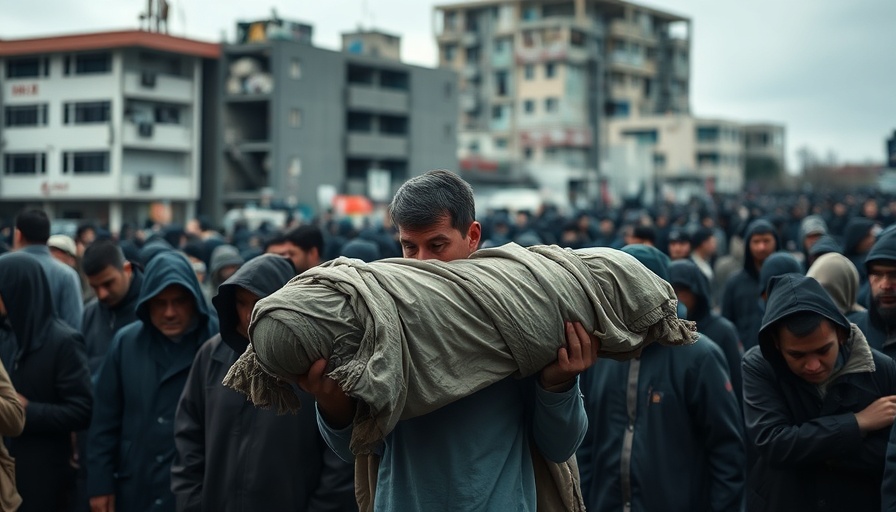
The Tragic Toll of Conflict: A Closer Look at Gaza's Humanitarian Crisis
The haunting images emerging from Gaza tell a story of unimaginable suffering. Just days ago, a tragic Israeli military raid in Khan Younis resulted in the deaths of nine children from Dr. Alaa al-Najjar’s family, rendering an already dire humanitarian situation even more devastating. The Dr. al-Najjar tragedy exemplifies the broader impact of ongoing hostilities in the region. This incident underscores reports from Gaza officials claiming that the killing of innocent children has almost become a disturbing norm in the conflict, prompting international outcry and condemnation.
Current Realities: A World Food Programme Alarm
Compounding the heartbreak is the fact that not only are lives being lost to direct violence, but systemic issues also threaten the future of an entire generation. The World Food Programme has issued a stark warning that more than 70,000 children in Gaza face acute levels of malnutrition, a crisis linked directly to the blockade and military operations in the region. One particularly heart-wrenching case is that of four-year-old Mohammed Yassine, who starved to death due to the lack of available food. Such incidents reflect the dire choices families have to make in times of conflict and highlight the urgent need for humanitarian aid.
Historical Context: The Longstanding Dispute
To fully understand the current scenario in Gaza, one must consider the historical context of the Israeli-Palestinian conflict, which has perpetuated cycles of violence and retaliation for decades. The struggle for land, identity, and sovereignty has created humanitarian crises that disproportionately affect civilians. From the wars in the 20th century to the more recent escalations in violence, families caught in the crossfire have become a tragic reality, as highlighted by the recent fatalities.
The Social Connection: Why Global Awareness Matters
Understanding the human cost of such conflicts is crucial not just for those directly affected but for global citizens as well. Increased international awareness can lead to a pressure for change. Public sentiment can influence governments to take a stand, whether that’s advocating for humanitarian aid or calling for ceasefires in the face of overwhelming evidence of civilian casualties. Every story, like that of Dr. Al-Najjar and his children, serves as a reminder of the global duty to address human rights violations and promote peace.
Future Predictions: What Lies Ahead for Gaza?
Looking ahead, the situation in Gaza appears to be precarious. Without significant intervention, the humanitarian crisis is likely to deepen, resulting in heightened social unrest and further violence. Analysts speculate that unless there is a dramatic shift in political will from both local and international leaders, the cycle of suffering will continue, potentially leading to more families like Dr. al-Najjar’s being torn apart.
Counterarguments: Diverse Perspectives on the Conflict
While much of the focus in international discussions is on the humanitarian impact, there are differing perspectives on how the Israeli government justifies its military actions. Some argue that in the face of ongoing threats, the military must act decisively to protect its citizens. However, the high civilian toll raises ethical questions that challenge the morality of such tactics. For humanitarian critics, the suffering of innocents cannot be justified, regardless of military objectives.
Actionable Insights: What can be done?
Civilians around the world can contribute to the cause by supporting humanitarian organizations that provide aid to those in conflict zones. Advocacy for policy changes that prioritize the safety and rights of civilians is essential. Engaging in conversations, spreading awareness, and participating in local or online campaigns can keep global eyes on the situation, leveraging social media platforms to amplify voices that call for change.
Conclusion: The Call for Awareness and Action
The wailing sirens and cries of children in Gaza serve as an urgent call for action. As international citizens, acknowledging the pain inflicted by conflict and advocating for humanitarian support can foster a more compassionate and enlightened global community. Let us remember the stories of lives lost and the families shattered and respond with the urgency they demand. Understanding that we all have a role in influencing policies that affect the vulnerable can lead to meaningful change.
 Add Row
Add Row  Add
Add 




 Add Row
Add Row  Add
Add 

Write A Comment